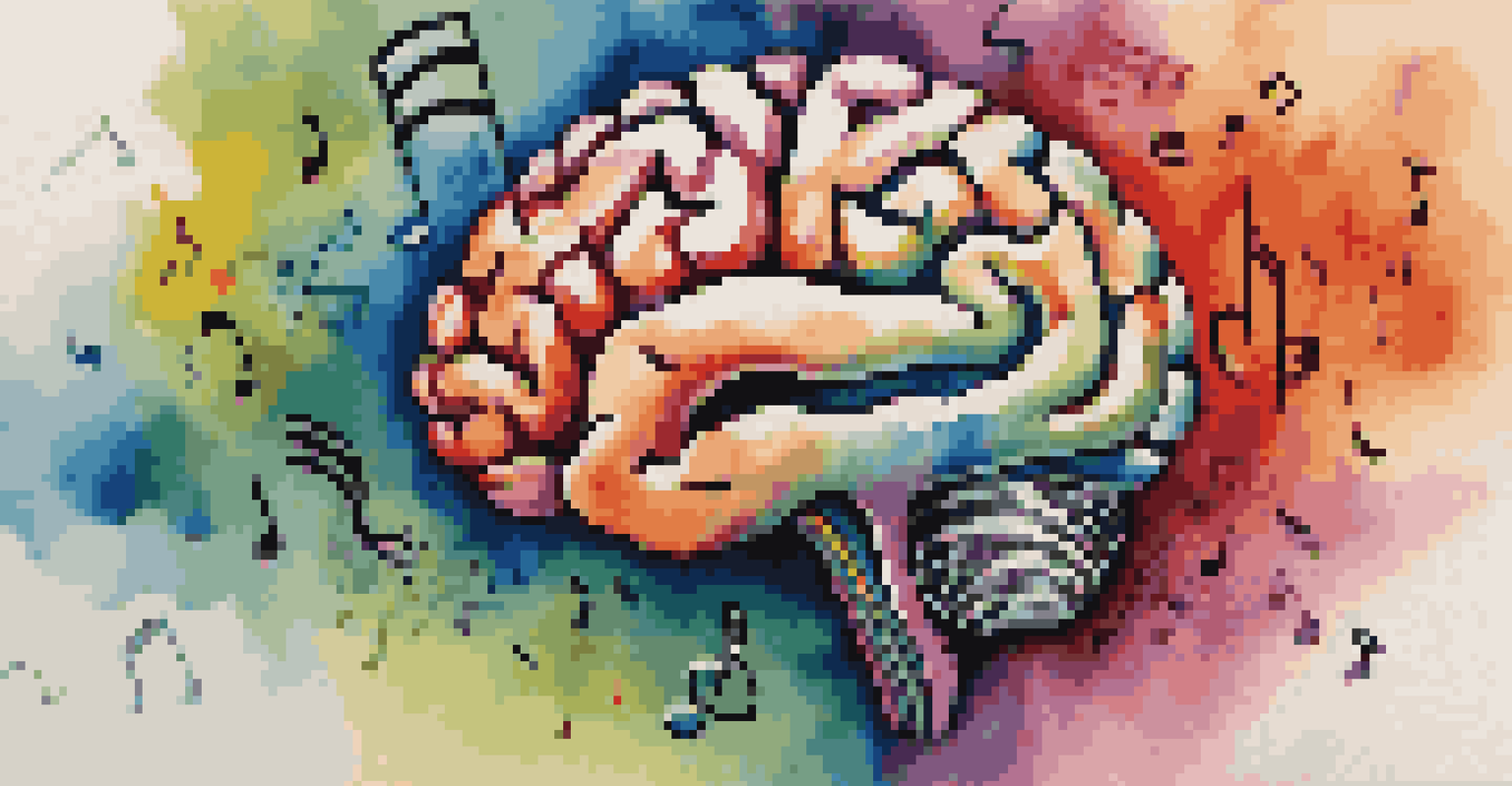How Music Engages the Brain's Executive Functioning Areas

Understanding Executive Functioning in the Brain
Executive functioning refers to a set of cognitive processes that help us manage our thoughts, actions, and emotions. These processes include planning, attention, problem-solving, and impulse control. Essentially, they act like the brain's conductor, coordinating various sections to create a harmonious output.
Music can change the world because it can change people.
When we engage in tasks that require executive functioning, we rely on specific brain regions, particularly the prefrontal cortex. This area is crucial for decision-making and moderating social behavior, making it essential for daily functioning. Think of it as the brain's control center, directing our thoughts and actions.
Understanding executive functioning is key to appreciating how music influences these processes. Just as a conductor shapes the performance of an orchestra, music has the power to enhance our cognitive abilities, leading to improved focus and mental agility.
How Music Stimulates the Brain
Listening to music activates multiple regions of the brain, including those responsible for emotion and memory. This multisensory engagement can create a rich tapestry of neural connections, enhancing cognitive function. When you hear your favorite song, it’s not just a pleasurable experience; it’s a workout for your brain.

Research shows that music can increase levels of dopamine, a neurotransmitter linked to pleasure and reward. This chemical boost can improve mood and motivation, making tasks feel more enjoyable. Imagine tackling a challenging project while listening to an upbeat playlist – the music can make the work feel lighter and more manageable.
Music Boosts Executive Functioning
Listening to music enhances cognitive processes like attention, problem-solving, and impulse control.
Moreover, music can enhance neuroplasticity, the brain's ability to reorganize itself by forming new connections. This adaptability is vital for learning and memory, as it helps us absorb and retain new information more effectively. In essence, music acts as a catalyst for brain growth and development.
The Role of Rhythm in Cognitive Performance
Rhythm plays a significant role in how music engages the brain. The predictable patterns of beats can help synchronize brain waves, improving focus and coordination. Think of it like the heartbeat of a song, setting the tempo for our cognitive processes.
The beautiful thing about learning is that no one can take it away from you.
Studies have shown that rhythmic music can enhance tasks requiring attention and memory. For instance, students often perform better on tests when they study with background music that has a steady beat. It’s as if the rhythm provides a mental anchor, helping them stay on track.
Furthermore, rhythm can also enhance our ability to multitask. By training our brains to anticipate beats, we become more adept at juggling different tasks simultaneously. So, the next time you find yourself tapping your feet while working, remember that rhythm is doing wonders for your brain.
Music and Emotional Regulation
Music has a profound impact on our emotions, which in turn affects executive functioning. Listening to certain genres can help us calm down or energize us, influencing our ability to concentrate and make decisions. This emotional connection is what makes music such a powerful tool for mental well-being.
For example, calming music can reduce stress levels, allowing individuals to think more clearly and make better choices. On the flip side, upbeat music can boost our energy levels, making us more productive. It’s like having a personal cheerleader, encouraging us to push through challenging tasks.
Rhythm Enhances Focus and Memory
The predictable patterns in rhythmic music can improve concentration and aid memory retention.
Understanding the emotional aspects of music can help us harness its power for self-regulation. By curating playlists that match our desired mood, we can create environments that foster better focus and mental clarity.
Music Training and Executive Functioning Skills
Engaging in music training, whether through playing an instrument or singing, has been shown to enhance executive functioning skills. Musicians often exhibit improved memory, attention, and problem-solving abilities, likely due to the complex cognitive demands of learning music. It’s like a gym workout for the brain, strengthening its capabilities.
For instance, learning to play an instrument requires practicing multiple skills at once, such as reading music, timing, and coordination. This multitasking helps sharpen cognitive abilities, making musicians more adept at handling various challenges in life. Think of it as training for the brain, enhancing its overall performance.
Additionally, music education fosters discipline and perseverance, traits that are crucial for effective executive functioning. By committing to regular practice, individuals learn the importance of setting goals and following through, skills that are transferable to other areas of life.
The Impact of Music on Memory and Learning
Music can significantly enhance memory retention and recall, thanks to its ability to create strong emotional associations. When we pair information with melodies or rhythms, it becomes easier to remember. This is why many people find it helpful to set facts to music during study sessions.
Research has shown that background music can improve learning outcomes, particularly in subjects requiring memorization. Students often report better recall of information when they’ve learned it in a musical format. It's as if the music acts as a mnemonic device, aiding in the retention of knowledge.
Music Training Builds Cognitive Skills
Engaging in music training fosters discipline and sharpens executive functioning abilities through complex cognitive demands.
Additionally, music can activate different types of memory, including procedural memory, which is crucial for tasks that require practice and repetition. This means that music not only helps us remember facts but also aids in mastering skills, making it a valuable tool for learners of all ages.
Practical Ways to Use Music for Cognitive Enhancement
Incorporating music into your daily routine can be a simple yet effective way to boost cognitive functioning. Consider creating specific playlists tailored for different tasks, such as studying, working, or relaxing. This way, you can harness the power of music to enhance focus and productivity.
Another practical approach is to use music for emotional regulation. When feeling stressed or overwhelmed, listen to calming tunes to help restore mental clarity. Alternatively, upbeat songs can motivate you to tackle chores or prepare for a workout, turning mundane tasks into enjoyable activities.

Lastly, exploring music-making as a hobby can provide both cognitive and emotional benefits. Whether it's learning an instrument or joining a choir, engaging in musical activities fosters creativity and enhances executive functioning skills. So, why not turn up the volume and let music be your brain's best friend?